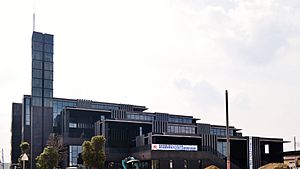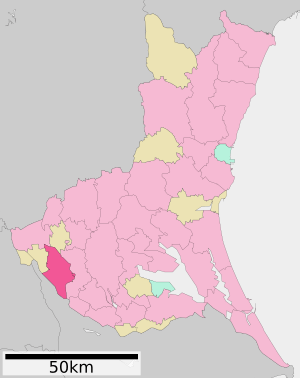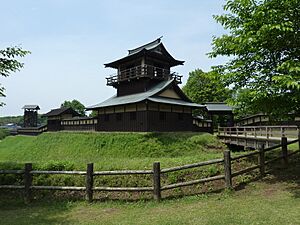Bandō, Ibaraki facts for kids
Quick facts for kids
Bandō
坂東市
|
|||
|---|---|---|---|

Bandō city hall
|
|||
|
|||
 |
|||
| Country | Japan | ||
| Region | Kantō | ||
| Prefecture | Ibaraki | ||
| Area | |||
| • Total | 123.03 km2 (47.50 sq mi) | ||
| Population
(October 2020)
|
|||
| • Total | 51,577 | ||
| • Density | 419.223/km2 (1,085.78/sq mi) | ||
| Time zone | UTC+9 (Japan Standard Time) | ||
| - Tree | Zelkova serrata | ||
| - Flower | Tea | ||
| - Bird | Japanese bush warbler | ||
| Phone number | 0297-35-2121 | ||
| Address | Iwai 4365, Bando City, Ibaraki Prefecture 306-0692 | ||
Bandō (Bandō (坂東市, Bandō-shi)) is a city located in Ibaraki Prefecture, Japan. As of October 2020, about 51,577 people lived there in 18,441 homes. The city covers an area of about 123 square kilometers (47.5 square miles). About 30.7% of the people living in Bandō are over 65 years old.
Contents
Where is Bandō?
Bandō is located in the southwestern part of Ibaraki Prefecture. It sits on the north side of the Tone River. Chiba Prefecture is just to its southwest. The city is about 50 kilometers (31 miles) northeast of Tokyo, Japan's capital.
Nearby Cities and Towns
Bandō is surrounded by several other places:
- In Ibaraki Prefecture:
- Jōsō
- Koga
- Yachiyo
- Sakai
- In Chiba Prefecture:
- Noda
What's the Weather Like?
Bandō has a climate with warm summers and cool winters. Sometimes there is light snowfall. The average temperature for the whole year is about 14.3 degrees Celsius (57.7 degrees Fahrenheit). September is usually the wettest month. The hottest month is August, with temperatures around 26.4 degrees Celsius (79.5 degrees Fahrenheit). January is the coldest, at about 3.2 degrees Celsius (37.8 degrees Fahrenheit).
How Many People Live Here?
The number of people living in Bandō grew until about 1990. Since then, the population has slowly gone down.
| Historical population | ||
|---|---|---|
| Year | Pop. | ±% |
| 1920 | 37,015 | — |
| 1930 | 39,661 | +7.1% |
| 1940 | 42,007 | +5.9% |
| 1950 | 51,707 | +23.1% |
| 1960 | 48,176 | −6.8% |
| 1970 | 48,853 | +1.4% |
| 1980 | 55,204 | +13.0% |
| 1990 | 58,699 | +6.3% |
| 2000 | 58,673 | −0.0% |
| 2010 | 56,114 | −4.4% |
| 2020 | 52,265 | −6.9% |
A Look at Bandō's History
The area that is now Bandō was once part of a larger region called Shimōsa Province. This was before the Meiji period began in Japan. On April 1, 1889, a small village called Iwai was created. It was part of Sashima District, Ibaraki.
Iwai grew and became a town on July 4, 1900. Later, on April 1, 1972, it became a city. The city of Bandō was officially formed on March 22, 2005. This happened when the city of Iwai joined together with the nearby town of Sashima.
What Does Bandō Produce?
Bandō has a mixed economy. This means it has different types of businesses. There are many industrial parks, which are areas with lots of factories and businesses. The region is also well-known for growing certain crops. Farmers in Bandō traditionally produce leeks, lettuce, and Chinese cabbage.
Schools in Bandō
Bandō has many schools for young people.
- There are 13 public elementary schools.
- There are four public middle schools.
- The city government runs these schools.
- There are also two public high schools. The Ibaraki Prefectural Board of Education operates these.
Getting Around Bandō
Trains
Bandō does not have any passenger train service. This means you cannot travel by train directly to or from the city.
Highways
You can reach Bandō by car using these major roads:
 Ken-Ō Expressway – Bando Interchange
Ken-Ō Expressway – Bando Interchange National Route 354
National Route 354
Fun Places to Visit
- Site of Sakasai Castle: This is where an old castle used to stand. It's a historical spot to explore.
- Ibaraki Nature Museum: A great place to learn about nature in the Ibaraki area.
Bandō Around the World
Bandō has a special connection with a city in the United States.
 Pine Bluff, Arkansas, United States, has been a sister city since October 9, 1989. This means they share a friendly relationship and cultural exchanges.
Pine Bluff, Arkansas, United States, has been a sister city since October 9, 1989. This means they share a friendly relationship and cultural exchanges.
Famous People from Bandō
- Makoto Takimoto: A famous judoka (someone who practices judo).
- Wakanami Jun: A sumo wrestler.
See also
 In Spanish: Bandō (Ibaraki) para niños
In Spanish: Bandō (Ibaraki) para niños





